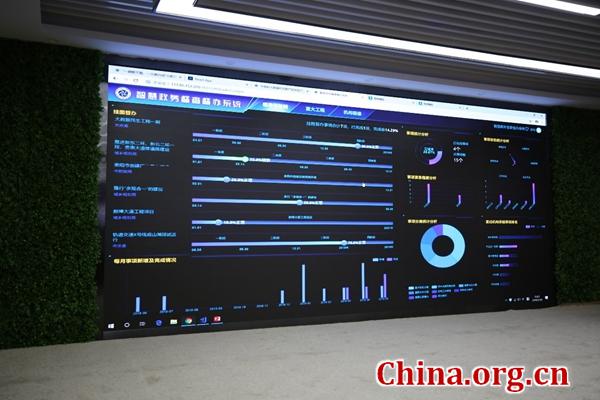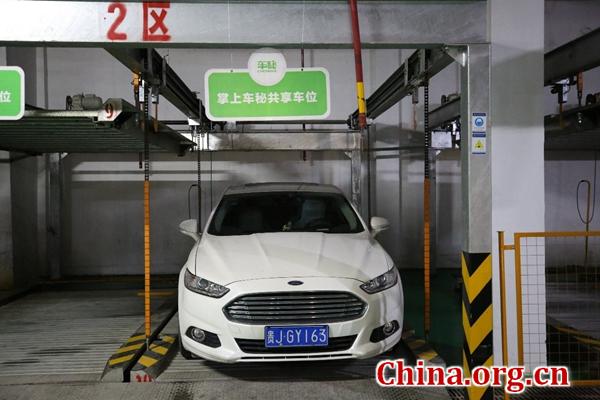Guizhou creates model on big data development

A visitor tours a digital economy display center in Gui'an New Area of southwest China's Guizhou province, May 20, 2019. [Photo/Xinhua]
Thanks to its constant strategies for big data development, southwest China's Guizhou province has witnessed continuous results in promoting the application of big data in government administration as well as commercial and civilian use in recent years.
The province is seen as providing a good model for other Chinese provincies in moving from late starter to a leader of big data development.
As one of the first national big data comprehensive pilot areas in China, Guizhou is committed to creating a suitable environment for further development, and Guiyang, the provincial capital, recently successfully staged the China International Big Data Industry Expo 2019 (aka the 2019 Big Data Expo), the fourth straight year it has done so.
A number of famous domestic and foreign science and technology companies have established branches in the city, so that Guiyang, becoming known as the "data valley" of China, has become a wind vane for global big data development.
Early in 2013, the Guizhou Provincial Committee of the Communist Party of China and the provincial government jointly took on the task to develop a big data industry. According to Xu Hao, executive vice-mayor of Guiyang, the province is richly endowed by nature for developing big data, such as lower power consumption, clean air and cheap electricity.
Through its efforts in big data development, Guizhou's resource advantages have been transformed into industrial advantages.
Big data helps improve government administration capability
Since Guizhou initiated efforts for the collection and connection of data, it has actively facilitated public access to government data by accelerating the building of platforms for data sharing, intensifying horizontal integration and management of data, and enhancing data exchange among the government departments.
In 2016, Guizhou-Cloud data sharing and exchange platform officially went into service. In turn, the platform, which links the various cities of Guizhou province, set up sub-platforms for collecting data including demographic information, health care and targeted poverty alleviation.
In 2017, the platform was connected to China's national data sharing and exchange platform as the first linkage of its kind, basically forming a system that connects central government departments, government departments at various levels of Guizhou, and government agencies.

A screen shows government administration data. [Photo by Gao Zhan/China.org.cn]
Nowadays, the data sharing and exchange platform of Guiyang Municipal Government has realized a level of 100% exchange of government data. It was selected for the 2018 big data industry development pilot demonstration project of the Ministry of Industry and Information Technology. At the same time, it opened more than 6.18 million items related to government affairs to society free of charge.
Big data helps improve people's well-being
Big data has helped bring dividends to people's livelihood in Guizhou province. Its cloud service platform for online medical services, which covers 199 public hospitals, is the first unified provincial-level platform enabling patients to make appointment with doctors online.
With the online government service platform of Guizhou connecting government departments at five levels spanning from the provincial government to village committees, people in Guizhou can receive services from government departments without ever having to leave their homes.
Some technology companies have provided a smart parking system and shared parking that automatically identify the car, record the parking time, and offer a smart payment facility, making better use of available parking spaces.
Besides, big data has helped reduce the time for administrative examination and approval in Guizhou from 22 to 10.9 working days. Meanwhile, the launch of such online service platforms for the convenience of the people as Guizhou-Cloud online service platform is enabling a large number of people to gain access to various convenient services through their mobile phone.
Attracted by the great opportunities in big data development, a number of global top 500 companies like Apple Inc., Qualcomm, Intel Corporation, Microsoft Corporation, as well as domestic leaders in big data industry including China Electronics Technology Group Corp., Alibaba and Huawei have established branches in Guizhou one after another.
Attracting talents
Under the influence of Guizhou's achievements in big data development, the number of college graduates coming to the province for work has been increasing by an average of more than 10,000 every year.
In 2016, Guizhou was the seventh most popular provincial-level administrative area in China for the inflow of college graduates. It then jumped to second place in 2017, and to first place in 2018.
In order to attract more talents and further promote big data development, Guizhou has released a number of policy-related documents with the aim of clarifying, guiding and providing support for big data development, big data talent team building, and the approval and accreditation for professional qualifications of big data talents.

A shared parking space in Guiyang, Guizhou province. [Photo by Gao Zhan/China.org.cn]
By offering support to big data talents in such ways as providing talents with "green card" service, housing purchase subsidies, apartments and other forms of awards, Guizhou has tried its best to encourage big data enterprises to cooperate with colleges and universities, scientific research institutes and vocational training institutes to set up bases for educational practice and practical training.
Meanwhile, Guiyang National High-tech Industry Development Zone (Guiyang HIDZ), as the area in Guizhou with the most big data companies and talents, has rolled out 12 "Ten Policies" covering such fields as big data, science and technology.
"When I first started my own business, the microenterprise department of Guiyang HIDZ administration for industry and commerce helped my company receive an interest-free loan of 200,000 yuan, while the Science and Technology Bureau of Guiyang offered us a batch of equipment," said Gong Boxiang, founder of Guizhou Xishan Technology Co., Ltd.
Gong, 28, from Hefei City in east China's Anhui province, said the close attention Guiyang paid to big data development was an important reason for his decision to stay in the city.
Huo Tao came to Guiyang from east China's Shandong province in 2015, and established Guizhou Baishan Cloud Technology Co., Ltd. later that same year. After three years of development, Huo's company is now providing services for 300 large- and medium-sized internet-based companies including Microsoft Corporation and Toutiao.
Sound institutional mechanisms assure data development and sharing
In 2016, Guizhou became the first provincial-level administrative area in China to issue regulations on promoting the development and application of big data.
In 2017, Guiyang Municipal Government officially issued the regulations on the sharing and opening of its data, and carried out the research and formulation of 15 big data-related local standards and promoted their implementation in the province. The regulations were the first local regulations on big data in Chinese cities with district-level administrative areas.
Moreover, in 2018, Guizhou started another round of legislative research of big data for further regulation for enhanced sharing of government data.

